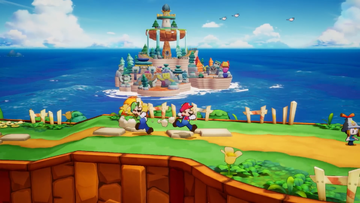Concordia
This article is about a subject in an upcoming or recently released game. When the game is released, or more information about this subject is found, this article may need major rewriting.
This notice should be removed after a month has passed since the game was first released.
| Concordia | |
|---|---|

| |
| First appearance | Mario & Luigi: Brothership (2024) |
| Inhabitants | Plug-like creatures (Connie, Snoutlet) |
Concordia[1] is the main setting of Mario & Luigi: Brothership. It is described as a parallel world where the ocean stretches out before Mario and Luigi, to which they arrive through a mysterious portal that opened up near Peach's Castle.[2] Concordia was once a single continent, but it was broken apart into many islands.[3] These islands range from tropical rainforests to bustling cities, and can be accessed by the brothers via the cannon mounted on top of Shipshape Island. Its name is the Latin word for harmony, and serves as a pun on "connection cord." It may also have been chosen as a reference to several real-life historical sailing ships of the same name, and Concordia-class cruise ships.
Names in other languages
| Language | Name | Meaning | Notes |
|---|---|---|---|
| Japanese | コネクタルランド[4] Konekutaru Rando |
Connector Land | |
| Chinese | 柯連庫塔魯大地[?] Kēliánkùtǎlǔ Dàdì |
Connector Land | |
| Dutch | Condordia[5] | Portmanteau of "conductor" and oord ("region"), combined with place-name suffix "-ia" | |
| French | Connexia[6][7] | From connexion ("connection") and place-name suffix "-ia" | |
| German | Konektania[8] | From "connector" (in German reading) and place-name suffix "-nia" | |
| Italian | Elettria[9] | From elettricità ("electricity") and place-name suffix "-ia" | |
| Korean | 커넥탈랜드[10] Keonektal-raendeu |
Connector Land | |
| Portuguese | Elétria[11] | From eletricidade ("electricity") and place-name suffix "-ia" | |
| Spanish | Concordia[12][13] | - |
References
- ^ https://www.nintendo.com/us/store/products/mario-and-luigi-brothership-switch/?srsltid=AfmBOop6iogSN7xhjF4Qrc3_5p7CLjpndY-eZgtq-5DMLb2rTHnLG7aj
- ^ https://www.nintendo.com/jp/topics/article/acd3764f-2b2c-4d6b-a66d-ddd88064909e
- ^ Nintendo of America (October 10, 2024). Mario & Luigi: Brothership – Overview Trailer – Nintendo Switch. YouTube (English). Retrieved October 10, 2024.
- ^ https://www.nintendo.com/jp/topics/article/acd3764f-2b2c-4d6b-a66d-ddd88064909e
- ^ https://www.nintendo.com/nl-be/Games/Nintendo-Switch-games/Mario-Luigi-Brothership-2590264.html
- ^ https://www.nintendo.com/fr-fr/Games/Nintendo-Switch-games/Mario-Luigi-Brothership-2590264.html
- ^ https://www.nintendo.com/fr-ca/store/products/mario-and-luigi-brothership-switch/
- ^ https://www.nintendo.com/de-ch/Spiele/Nintendo-Switch-Spiele/Mario-Luigi-Brothership-2590264.html
- ^ https://www.nintendo.com/it-it/Games/Nintendo-Switch-games/Mario-Luigi-Brothership-2590264.html
- ^ https://store.nintendo.co.kr/70010000084615
- ^ https://www.nintendo.com/pt-br/store/products/mario-and-luigi-brothership-switch/
- ^ https://www.nintendo.com/es-es/Games/Nintendo-Switch-games/Mario-Luigi-Brothership-2590264.html
- ^ https://www.nintendo.com/es-mx/store/products/mario-and-luigi-brothership-switch/